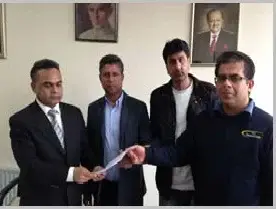JKNIA Calls on Pakistani PM to Accept Gilgit Baltistan Charter of Demand
The Jammu Kashmir National Independence Alliance (JKNIA) has urged the Prime Minister of Pakistan to accept the Awami Action Committee Gilgit Baltistan (AACGB) Charter of Demand. A delegation of Kashmiri Diaspora organizations, led by Mahmood Kashmiri, Chairman of JKNIA, has officially submitted a memorandum to the Consul General of Pakistan in Bradford.
Solidarity with Gilgit Baltistan
The memorandum, signed by prominent leaders including Mahmood Kashmiri (JKNIA), Ghulam Hussain (KFM), Ershad Malik (JKDFP), Mirza Siddique (JKPF), Nadeem Aslam (JKNIA), Younas Taryabi (KWA), Sardar Amjad Yousaf (UKPNP), and Kh. Mushtaq Hussain (JKNLC), expresses unwavering solidarity with the people of Gilgit Baltistan.
“JKNIA, along with civil society members and human rights activists in the UK and Europe, fully endorse the ‘Charter of Demand’ presented by AACGB,” the memorandum states.
The Kashmiri Diaspora in the UK and Europe has strongly criticized the Pakistani establishment for its dismissive approach toward the legitimate demands outlined in the AACGB’s charter. Despite ongoing peaceful protests and sit-ins (Dharna) across Gilgit Baltistan since April 15, 2014, the Pakistani government has yet to offer a meaningful response.
Condemnation of Colonial Practices
Expressing disappointment, Mahmood Kashmiri remarked, “We are disheartened to witness the colonial mindset that Pakistan continues to impose on the people of Gilgit Baltistan. The government is failing to fulfill its responsibilities under UN Security Council and UNCIP resolutions, both in Gilgit Baltistan and AJK.”
The memorandum highlights Pakistan’s negligence in addressing civil and political rights violations in the region. The international community, particularly the European Union, has urged Pakistan to reform its policies regarding Gilgit Baltistan and AJK. The EU Committee on Foreign Affairs Report (A6-0158/2007) – Kashmir: Present Situation and Future Prospects – further emphasizes the need for such reforms.
Rejection of the Karachi Agreement
The leaders of JKNIA have categorically rejected the Karachi Agreement of April 28, 1949, calling it a draconian colonial mechanism of subjugation and control. They emphasized that the agreement was imposed under duress and does not reflect the will of the people of Gilgit Baltistan and AJK.
Ghulam Hussain, President of the Kashmir Freedom Movement (KFM), echoed these sentiments, stating, “We express our deepest anguish and strongly condemn the insensitivity of the Pakistani government in responding to the AACGB’s Charter of Demand.”
JKNIA’s Demands to the Pakistani Government
JKNIA has called for immediate action from Pakistani Prime Minister Mian Mohammed Nawaz Sharif, urging him to:
- Fully accept the Awami Action Committee Gilgit Baltistan ‘Charter of Demand’ without delay.
- Respect and implement UN mechanisms as stipulated in UN Security Council and UNCIP resolutions for Gilgit Baltistan.
- Engage in meaningful dialogue with independent representatives of Gilgit Baltistan and AJK to renegotiate governance structures.
A Test for Pakistan’s Democratic Credibility
The memorandum concludes with a strong message to the Pakistani government: “Your actions will define whether Pakistan is truly an Islamic democratic state and a responsible member of the global community. We urge you to take immediate steps to protect the rights, freedoms, and security of the people of Gilgit Baltistan by fully accepting the AACGB’s Charter of Demand.”
JKNIA and its allied organizations await the Pakistani government’s response, hopeful that justice and democratic governance will prevail in Gilgit Baltistan and AJK.


